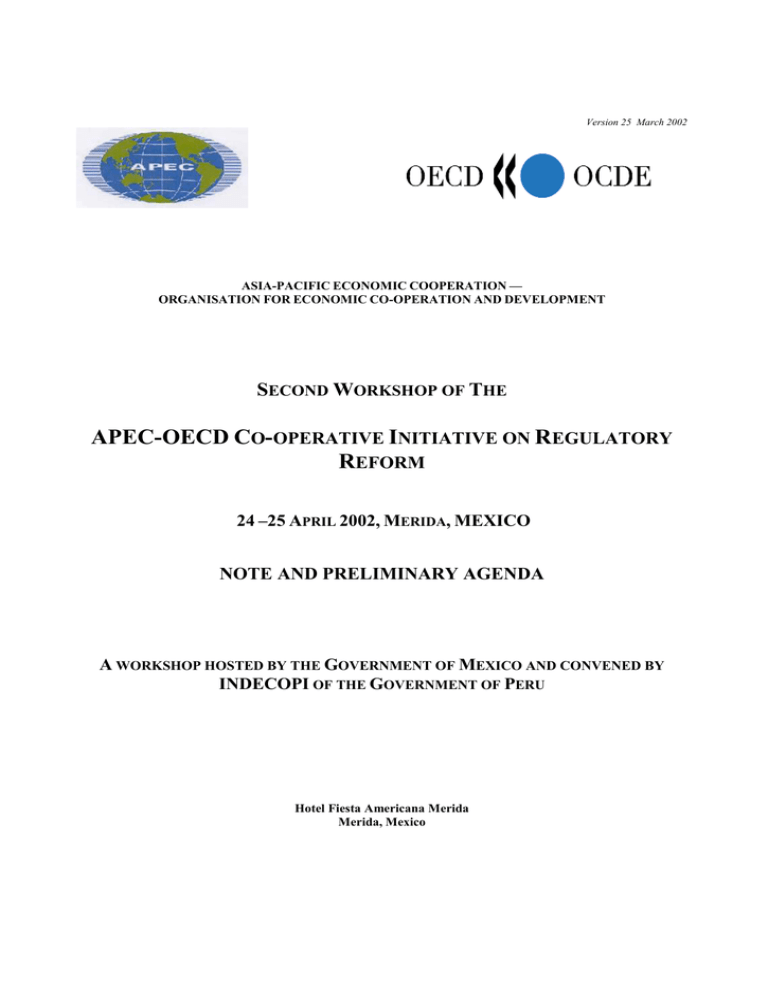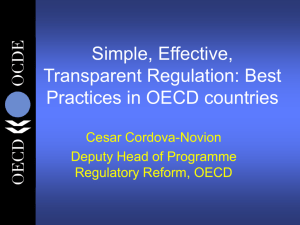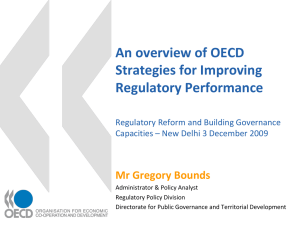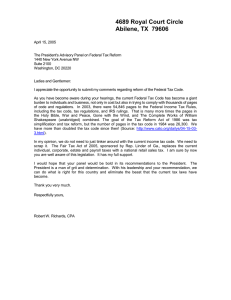APEC-OECD C -
advertisement

Version 25 March 2002 ASIA-PACIFIC ECONOMIC COOPERATION — ORGANISATION FOR ECONOMIC CO-OPERATION AND DEVELOPMENT SECOND WORKSHOP OF THE APEC-OECD CO-OPERATIVE INITIATIVE ON REGULATORY REFORM 24 –25 APRIL 2002, MERIDA, MEXICO NOTE AND PRELIMINARY AGENDA A WORKSHOP HOSTED BY THE GOVERNMENT OF MEXICO AND CONVENED BY INDECOPI OF THE GOVERNMENT OF PERU Hotel Fiesta Americana Merida Merida, Mexico SECOND WORKSHOP OF THE APEC-OECD CO-OPERATIVE INITIATIVE ON REGULATORY REFORM 24 -25 APRIL 2002, MERIDA, MEXICO APEC and OECD economies have embraced a similar set of regulatory quality principles as the foundation for further progress on regulatory reform. The September 1999 APEC declaration for supporting growth through strong and open markets included APEC Principles to Enhance Competition and Regulatory Reform. Regulatory quality is at the core of the OECD’s 1997 Report to Ministers on Regulatory Reform and the OECD’s current in-depth reviews of regulatory practices in its Member economies. In the 1997 Report, Ministers from OECD economies reached agreement on a broad set of principles for regulatory reform, covering economic regulations, social regulations, and government formalities. An APEC-OECD Agreement on joint work on regulatory reform was developed in the Fall 2000 and was endorsed at the APEC Ministerial Meeting on 12-13 November 2000 in Brunei Darussalam (www.apecsec.org.sg/whatsnew/press/rel53_2000.html). The Agreement set out the framework for the cooperative initiative for APEC and OECD, with the aim of supporting implementation of the principles on regulatory reform adopted by the Member economies of the two organisations. The joint work in 2001 and 2002 focuses on an exchange of information and experiences on good regulatory practices and concepts built around the common agenda established by the APEC declaration and OECD principles. The joint APEC/OECD programme A series of events is considered to be best suited to advance a common understanding of the Regulatory Reform agenda and to establish durable networks among economies. The launching conference, held in Singapore on 22—23 February 2001, brought together even 30 economies, several international organisations, the private sector and trade union representatives. The conference was also an opportunity to specify further APEC/OECD co-operation through a series of three workshops. The first workshop was held on 19 -20 September 2001 in Beijing. The discussions focussed on (1) Designing and sustaining a broad regulatory reform programme and (2) Improving the Competition Policy Foundation for Regulatory Reform (see programme attached).1 In 2002, the two follow up workshops will be held with the co-operation of the governments of Mexico and Korea in April and October 2002, respectively. The following note and preliminary agenda details the Mexico workshop to be organised in Merida, Mexico on 24-25 April 2002. 1. The Proceedings of the Beijing Workshop are available at : http://www.oecd.org/oecd/pages/home/displaygeneral/0,3380,EN-document-2-nodirectorate-no-20-84502,FF.html 2 18 September 2001 NOTE FOR THE MERIDA WORKSHOP APEC-OECD CO-OPERATIVE INITIATIVE ON REGULATORY REFORM Organisation: The two-day workshop will take place in Merida, Mexico on 24-25 April. Mexican authorities will provide logistic support. Format of the discussions: The workshop will be divided into two one-day sessions. Each session will be built around policy and technical discussions. Speakers will introduce the relevant themes based on the experience of an individual country and in a more broadly relevant approach. Following those introductions, discussions could be initiated which would allow for an open and frank exchange of views and experiences. Speakers will provide a one-page summary of their presentation at least a week prior to the workshop. Participation: Participants will be officials from APEC and OECD economies and Secretariats, invited representatives from other international organisations, and invited representatives of the private sector, trade unions and academia. Proceedings: The Secretariat will produce a Final Report including the presentations, which will be available on the APEC-OECD Internet site. Background: Regulatory reform continues to accelerate throughout the APEC and OECD economies, as market liberalisation deepens in many sectors, markets open to trade and investment, and reform of public sector institutions creates capacities for more transparent and efficient regulatory regimes. Both APEC and OECD Ministers have noted that these reforms can be effective in boosting sectoral efficiency and innovation, enhancing economy-wide flexibility and potential growth, increasing consumer choice and welfare, and increasing government effectiveness in maintaining high standards of environmental, consumer, and safety protections. Regulatory reforms have helped ease trade tensions by addressing behind-the-border impediments to international trade and investment. Regulatory reform also reduces the vulnerability of economies to external shocks, reducing the risk of economic crisis. As a result, supply-side reforms to stimulate investment and competition and reduce regulatory inefficiencies have become central to effective economic policy. The regulatory reform agenda includes objectives of good governance. Regulatory reform today is based on ideas of “regulatory quality,” or the appropriate use of regulation to support market functioning and foster public interests. Pro-competition regulations and institutions, such as competition and consumer policies and independent regulators, are needed to enforce market competition. Domestic regulations will continue to be essential tools of governments to carry out vital public policies such as safety and health, labour standards, environmental protection, and consumer protection, but those regulations should be as efficient as possible to avoid wasting economic resources. The Mexico workshop, the second of three workshops scheduled in 2001-2002, will further the implementation of the regulatory principles by examining two important regulatory reform strategies: The design and practical operation of RIA (Regulatory Impact Analysis) as a necessary tool for sustaining regulatory reform. The integration of market openness into the regulatory systems as an important component of regulatory reform. 3 Discussion of each of these strategies will be divided into three panels made up of representatives of APEC and OECD economies, academics, trade unions, and business interests. There will be ample time for discussion by all conference participants. Each panel will last approximately two hours. 4 18 September 2001 PRELIMINARY AGENDA OF THE MERIDA WORKSHOP WEDNESDAY 24 APRIL 2002 8:45 - 9:30 Registration 9:30 – 10:30 Welcome and opening remarks Luis Ernesto Derbez Bautista, Minister of Economy, Mexico Deputy Secretary General OECD Margarita Trillo, Convenor of the Competition Policy and Deregulation Group, APEC and Head of International Relations and Technical Cooperation, INDECOPI (National Institute for the Defense of Competition and Protection of Intellectual Property), Peru. Ms. Trillo will review some of the important messages from the opening conference in Singapore in February 2001 and the First Workshop in Beijing, China, September 2001. 10:30 – 18:00 Session 1: Regulatory Impact Analysis Systems Chair: Rolf Alter, Head of Programme on Regulatory Reform OECD. Rapporteur: Luigi Carbone, Chair of the OECD Working Party on Regulatory Management and Reform, and, for the Italian government, Counsellor of State and Deputy Director of the Regulatory Simplification Unit. In an era of competitive global markets and rapid technological change, governments need to improve their understanding of the costs and benefits of regulation. Regulatory Impact Analysis (RIA) — the systematic assessment of positive and negative impacts of regulation and alternatives— has helped many economies to reduce regulatory costs on businesses, while maximising the effectiveness of government action in protecting public interests. RIA has also been instrumental in improving transparency and communication with concerned interests. This session will be divided into three panels that will examine how economies have addressed basic issues of setting up and enforcing a RIA system: Setting up the institutional framework for a successful RIA system Analytical tools and methods in RIA systems RIA as a consultation and communication tool 5 10:30 – 12:30 Panel 1: Setting up the institutional framework for a successful RIA system RIA, as the basic regulation for regulators, needs the adequate institutional framework to provide the right incentives for rule makers to produce high quality regulation. First and foremost, a successful RIA systems needs political backing to set up the system but years if not decades of maintenance and improvement are required to show an improved regulatory environment. The political decision also needs be translated into an adequate institutional setting. Experiences in many countries show no exception to the rule that RIA will fail if left entirely to regulators, but it will also fail if it is too centralised. To ensure ownership by the regulator and at the same time quality control and consistency, responsibilities should be shared between regulators and a central control unit. The panel will discuss the governmental policies and the legal framework for operating a RIA; the scope of RIA and its exemptions; the administrative procedures and their enforcement, and the human and financial capacities needed by the central units in charge of overseeing the process as well as of the regulators (i.e. proponent ministries) in charge of preparing RIAs. Among the invited speakers are: Cesar Cordova-Novion, Deputy head of the Regulatory Reform Programme, OECD Secretariat, “Formal Policies for RIA in OECD countries” Steven Blake, Regulatory Impact Unit, Cabinet Office United Kingdom, “Setting up a Regulatory Impact Unit”. Ali Haddou, Co-ordinator of Regulatory Impact Assessment, Federal Regulatory Improvement Commission – COFEMER, Ministry of Economy, Mexico, “Improving the Capacities and Enforcing RIAs Among Regulators”. 12:30 – 13:30 Lunch and visits to document tables 13:30 – 15:30 Panel 2: Analytical tools and methods in RIA systems As for all processes, the quality of RIA is related to the quality standards selected for assessing regulations. Typical standard tests vary from business compliance costs to benefit-cost analysis. However the methodology selected needs to be flexible according to the cost of collecting and processing the data as well as to the administrative capacities and resources to prepare a RIA. A RIA system also needs to balance the need for simplicity and timeliness with precision and robustness. The panel will discuss the pros and cons of alternative methods to measure the impacts of regulation including cost and benefit analysis, risk analysis techniques for health, safety, and environment regulations, qualitative indicators, etc. Among the invited speakers are: 6 18 September 2001 Ge Linssen, Head of Competition, Deregulation and Quality of Regulation Project, Ministry of Economic Affairs, The Netherlands, “Measuring the Impact of Regulation in the Netherlands” Randall Lutter, Ph.D. Fellow, AEI-Brookings Joint Center for Regulatory Studies, USA “How to cope with information problems when analysing a RIA” (to be confirmed) 15:30 – 16:00 Coffee and visit to document tables 16:00 – 17:45 Panel 3: RIA as a consultation and communication tool A good regulatory policy approach should be based on the principle of no regulation without representation. Using RIA in consultation and communication approaches helps bring transparency into regulatory decision-making processes. It provides an opportunity to the regulated parties to offer their understanding of the rationale as well as their perspective of the future impacts of the regulation. Public involvement in RIA improves the quality of RIAs by providing an additional source of important data and by subjecting the resulting analysis to critical assessment, helping to identify poor assumptions, faulty reasoning and unanticipated effects. Moreover, this improves compliance with the regulation and thus decreases the enforcement costs. The panel will examine different strategies to use RIA as a consultation and communication device. Among the invited speakers are: George Redling, Assistant Secretary to the Cabinet, Privy Council Office, Operations, Canada “The Canadian Experience with the prepublication of RIAs” Changfa Lo, Professor of National Taiwan University and former Commissioner of the Fair Trade Commission,Chinese Taipei Mike Waghorne, Assistant General Secretary, Public Services International (PSI) 17:45– 18:00 Summary by the Rapporteur 7 THURSDAY 25 APRIL 2002 9:30 – 17:00 Session 2: Integrating Market Openness into Regulatory Systems Chair: Margarito Trillo, Convenor of the Competition Policy and Deregulation Group, APEC and Head of International Relations and Technical Co-operation, INDECOPI (National Institute for the Defense of Competition and Protection of Intellectual Property), Peru. Rapporteur: Joanna Shelton, Deputy Director, the University of Montana, USA; Former Deputy Secretary General of the OECD The interlinkage between efficient regulation and open conditions for trade and investment is an important aspect of regulatory reform. The Doha Development Agenda agreed by WTO Ministers in November 2001 will directly and indirectly intensify the focus of economies on nontariff barriers arising from national or local regulation. A regulatory system that avoids unnecessary barriers to trade and investment will help countries draw full benefit from competition in a global economy by strengthening national economic performance and enlarging consumer benefits. This concept underlies the APEC Principles to Enhance Competition and Regulatory Reform as well as similar OECD principles. This session will be divided into three panels: Complementary Relationship between Regulatory Reform and Market Openness The regulatory framework for internationally contestable markets : the case of customs procedures Problems and solutions in favouring the use of international harmonised standards and the recognition of equivalence of foreign measures 9:30 – 10:45 Panel 1: Complementary Relationship between Regulatory Reform and Market Openness Does the national regulatory system allow enterprises to take full advantage of opportunities for competition in global markets? Reducing regulatory barriers to trade and investment enables countries in a globalising economy to benefit more fully from technological innovation and achieve greater efficiency in production and marketing, thereby bringing greater benefits for consumers. Maintaining an open world trading system requires regulatory styles and content that promote global competition and economic integration, avoid trade disputes and improve confidence across borders. In this panel, regulatory reforms that enable a more open market for products, services and investment will be discussed. Among the invited speakers are: 8 18 September 2001 Angel Villalobos, Vice Minister of International Trade Negotiation, Mexico (to be confirmed) Anthony Kleitz, Head of Trade Liberalisation and Review Division, OECD Secretariat Wenhong Tang, Director, Department of Treaty and Law, Ministry of Foreign Trade and Economic Co-operation, China German King, Vice chair of Committee on Trade and Investment of APEC 10:45 - 11:00 Coffee and visits to document tables 11:000 – 13:15 Panel 2: The regulatory framework for internationally contestable markets: the case of customs procedures Customs procedures respond to a wide array of government objectives, including revenue collection, health and safety protection or prevention of illegal practices. They tend as a result to be based on highly complex and sometimes duplicative practices, imposing significant delays and costs on commercial operators. The increasing importance of these time and cost burdens relative to more “traditional” trade barriers has put “trade facilitation” (i.e. the simplification and harmonisation of international trade procedures) high on the political agenda. Reform in this area tries to reconcile the efficient pursuit of these objectives with a simplified way of doing business, streamlining documentary requirements and accelerating product clearance. Among the invited speakers are: Dong Yufan, Section Chief for Multilateral Affairs Division, Department of International Co-operation, Customs General Administration of China Alejandro Buvinic, First Secretary, Permanent Mission of Chile to the WTO Fermin Cuza, Chairman of the International Chamber of Commerce Commission on Customs and Trade Regulations Peter Wilmott, Director, Simpler Trade Procedures Board(SITPRO), the United Kingdom 13:15 - 14:30 Lunch and visits to document tables 14:30 - 16:15 Panel 3: Problems and solutions in favouring the use of international harmonised standards and the recognition of equivalence of foreign measures 9 A significant cause of regulatory barriers to trade and investment is the divergence and duplication of regulations in different markets, obliging firms wishing to be present in several markets to maintain different production lines and to submit them to duplicative testing and certification procedures. While there may be valid justifications for these divergences and duplications, they nevertheless entail costs that may seem excessive. In such cases, the question arises whether certain approaches would enable achievement of the intended regulatory results through more efficient and less costly means. The approaches most often identified are international harmonisation of applicable standards and recognition of equivalence of national testing and certification procedures (both through MRAs and unilaterally). Keeping in mind different national situations as well as sectoral specificities, this panel will discuss experience with and prospects for adopting such approaches. Among the invited speakers are: Charlotte Nyberg, the Confederation of Swedish Industries Brian Jenkinson, Deputy Head of Unit, the European Commission Graeme Ged, ISO Chan-Hyun Sohn, Senior Fellow, Department of Trade and Investment Policy, Korea Institute for International Economic Policy, Korea 16:15– 16:30 Summary by the Rapporteur 16:30 – 17:00 Final statement by APEC and OECD and announcement of the next workshop in Seoul, Korea 10


